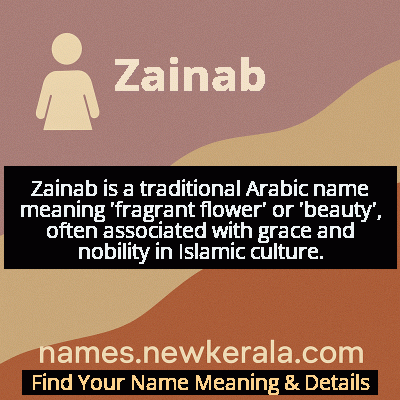Zainab Name Meaning & Details
Origin, Popularity, Numerology Analysis & Name Meaning of Zainab
Discover the origin, meaning, and cultural significance of the name ZAINAB. Delve into its historical roots and explore the lasting impact it has had on communities and traditions.
Name
Zainab
Gender
Female
Origin
Muslim
Lucky Number
8
Meaning of the Name - Zainab
Zainab is a traditional Arabic name meaning 'fragrant flower' or 'beauty', often associated with grace and nobility in Islamic culture.
Zainab - Complete Numerology Analysis
Your Numerology Number
Based on Pythagorean Numerology System
Ruling Planet
Saturn
Positive Nature
Ambitious, efficient, realistic, and authoritative.
Negative Traits
Materialistic, stressed, confrontational, and can be overly ambitious.
Lucky Colours
Dark blue, black.
Lucky Days
Saturday.
Lucky Stones
Blue sapphire, amethyst.
Harmony Numbers
2, 4, 6.
Best Suited Professions
Business leaders, managers, financial services, law enforcement.
What People Like About You
Leadership, determination, organizational skills.
Famous People Named Zainab
Zainab bint Muhammad
Religious Figure
Daughter of Prophet Muhammad, early Muslim community leader
Zainab bint Ali
Religious Leader
Heroine of Karbala, preserver of Hussain's legacy through powerful sermons
Zainab Al-Ghazali
Islamic Activist
Founded Muslim Women's Association, influential Islamic writer and speaker
Zainab Salbi
Humanitarian
Founded Women for Women International, helping female war survivors globally
Name Variations & International Equivalents
Click on blue names to explore their detailed meanings. Gray names with will be available soon.
Cultural & Historical Significance
Extended Personality Analysis
Women named Zainab are often perceived as strong-willed, intelligent, and deeply principled individuals. They typically exhibit natural leadership qualities combined with emotional intelligence, enabling them to navigate challenging situations with grace and determination. The historical associations of the name contribute to expectations of resilience and moral courage—traits that often manifest in modern Zainabs as steadfastness in their convictions and loyalty to their principles. Many Zainabs develop strong communication skills and persuasive abilities, reflecting the legacy of Zainab bint Ali's powerful oratory. They often balance traditional values with modern perspectives, creating a unique blend of cultural rootedness and contemporary awareness. This combination makes them effective bridge-builders in their communities and families. While individual personalities vary, the name carries expectations of dignity, wisdom, and the ability to maintain composure during adversity, much like the historical figures who bore this revered name.
Modern Usage & Popularity
Zainab remains consistently popular across the Muslim world, ranking among the top 20 female names in countries like Pakistan, Egypt, and Nigeria. In Western countries with significant Muslim populations, the name has gained visibility while maintaining its cultural authenticity. The spelling 'Zaynab' has become increasingly common in English-speaking contexts, particularly in the United Kingdom and United States where it appears in birth registries with growing frequency. Modern usage reflects both religious reverence and contemporary appeal, with many parents choosing the name for its beautiful sound and powerful historical associations. The name has maintained steady popularity over decades rather than following fleeting naming trends, indicating its enduring cultural significance. In recent years, variations like Zeynep (Turkish) have gained international recognition through media and cultural exchange, further expanding the name's global footprint while preserving its essential meaning and heritage.
Symbolic & Spiritual Meanings
Symbolically, Zainab represents the fragrant flower that blooms in adversity, drawing from both its literal meaning and historical associations. The name embodies the paradox of delicate beauty combined with unyielding strength—much like a flower that withstands harsh conditions while maintaining its fragrance. It symbolizes eloquent resistance, as demonstrated by Zainab bint Ali's powerful speeches that preserved truth in the face of oppression. The name also carries connotations of spiritual fragrance—the idea that righteous character and faith leave a lasting impression much like pleasant perfume. In Sufi traditions, the name sometimes represents the soul's journey toward divine beauty while maintaining earthly responsibilities. It symbolizes the balance between feminine grace and formidable strength, making it a multidimensional name rich with metaphorical significance. The name serves as a living reminder that true beauty encompasses both external grace and internal fortitude, and that the most powerful revolutions often begin with courageous words spoken by resilient women.

